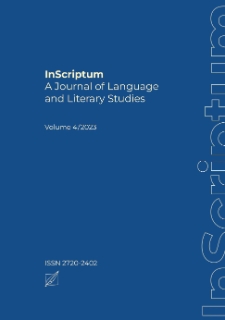Digital Library of the Jan Kochanowski University contains 13 097 digital objects
Object
Title: Charlotte Lennox’s Path to The Female Quixote: A Journey Along and Across Borders
Creator:
Group publication title:
Contributor:
Bianchi, Marina. Ed. ; Ożarska, Magdalena. Ed. ; Newman, John G. Ed. Marczewska, Marzena. Ed.
Abstract:
This paper explores the literary odyssey of Charlotte Lennox through the English cultural scene of the eighteenth century, marked by the rise of the novel and by a resurgence of Quixotism. Drawing upon biographical reconstruction, historical context, and textual analysis, it interprets Lennox’s multifaceted figure as that of a “frontier writer”, set on negotiating societal and literary boundaries by developing a transformative approach to gender and genre dynamics. After discussing the writer’s ability to forge alliances and turn perceived weaknesses into strengths, the essay traces her trajectory, from early ventures into poetry to her subsequent engagement in prose fiction. It eventually focuses on her second and most renowned novel, The Female Quixote; or, The Adventures of Arabella (1752), which can be read as a confirmation of the barriers of dominant ideology but also as a thought-provoking critique and a longed-for overcoming of those very barriers. Lennox’s work then sheds light on the ideological complexities of the eighteenth-century English novel, meant as a site of both border-raising and border-crossing.This paper explores the literary odyssey of Charlotte Lennox through the English cultural scene of the eighteenth century, marked by the rise of the novel and by a resurgence of Quixotism. Drawing upon biographical reconstruction, historical context, and textual analysis, it interprets Lennox’s multifaceted figure as that of a “frontier writer”, set on negotiating societal and literary boundaries by developing a transformative approach to gender and genre dynamics. After discussing the writer’s ability to forge alliances and turn perceived weaknesses into strengths, the essay traces her trajectory, from early ventures into poetry to her subsequent engagement in prose fiction. It eventually focuses on her second and most renowned novel, The Female Quixote; or, The Adventures of Arabella (1752), which can be read as a confirmation of the barriers of dominant ideology but also as a thought-provoking critique and a longed-for overcoming of those very barriers. Lennox’s work then sheds light on the ideological complexities of the eighteenth-century English novel, meant as a site of both border-raising and border-crossing.
Table of contents:
Contents
5 Marina Bianchi Artistic/Literary Spaces and Borders: A Brief Introduction to the Monographic Issue n. 4
Articles
11 Francesca Guidotti Charlotte Lennox’s Path to The Female Quixote: A Journey Along and Across Borders
35 José María Balcells Doménech Amor de Láser de Rafael Ballesteros: una poética de transgresión vanguardista
53 Francisco Javier Escobar Borrego “Palabras del agua” y “versos en piedra”: huellas de Guillén y Aleixandre en el imaginario poético-musical de Atencia (con paseos literarios, ecos de Caracola y coda cernudiana)
83 Fernanda Pavié Santana Espacio, memoria y resiliencia en Ruido de Álvaro Bisama (2012)
107 Domenico Coppola Dritte Räume und Widerspenstigkeit der Natur: eine Studie zu den Wechselwirkungen zwischen Mensch und Raum in Robert Seethalers Roman Ein ganzes Leben
131 Lia Pacini Between Fancy and Reality: The Crossing of Borders in Poe’s “Ligeia”
151 Marta Colleoni Debussy, l’étoffe d’un vrai poète ? La synthèse poétique-musicale des Proses lyriques
173 Andrea Cornaggia Monstres d’inépuisable beauté. L’effondrement des limites du corps grotesque chez Alfred Jarry
book reviews
195 Serenella Zanotti, James Joyce, English Teacher. Archival Explorations into Language Teaching in Early Twentieth-Century Europe, Rome: Bulzoni Editore, 2020, 204 pp. (Reviewed by Polina Shvanyukova, Università degli Studi di Udine)
199 Steven Swarbrick, The Environmental Unconscious. Ecological Poetics from Spenser to Milton. Minneapolis: University of Minnesota Press, 2023, pp. 336. (Reviewed by Stefano Rozzoni, Università degli Studi di Bergamo)
205 Marta Palenque y Ángela Rico Cerezo (eds.), Las colecciones El Cuento Nuevo (1918-1919 y 1934-1935), Ediciones Ulises, Consejo Superior de Investigaciones Científicas, colección Literatura Breve, Sevilla-Madrid, 2022. (Revisado por Juan Molina Porras, Sociedad Menéndez Pelayo)
211 Pedro J. Plaza, Matriz Granada: Valparaíso Ediciones, 2023, 112 pp. (Reseñado por Erica Lacanna, Università di Genova)
215 Isaac Rosa, Lugar seguro. Barcelona: Seix Barral, 2022, 309 pp. (Revisado por Rosa María Jiménez Padilla, Università degli Studi di Bergamo)
219 Toni Montesinos, Ojos llenos de alegría. Estar vivo con R.W. Emerson Barcelona: Editorial Ariel, 2023, 592 pp. (Reseñado por José de María Romero Barea, escritor, traductor, periodista cultural y profesor)
223 José María Saussol, Por el sendero. Almería: Círculo Rojo, 2022, 376 pp. (Revisado por Fernanda Pavié Santana, Università degli Studi di Bergamo)
Place of publishing:
Physical description:
ISSN:
Publisher:
Jan Kochanowski University Press
Date issued:
Identifier:
oai:bibliotekacyfrowa.ujk.edu.pl:12727 doi:10.25951/10568
Language:
Is part of:
InScriptum. A Journal of Language and Literary Studies
Has part:
Type:
Access rights:
License:
Licencja Creative Commons Uznanie autorstwa - Bez utworów zależnych (CC-BY-ND)
Format:
Object collections:
- JKU Digital Library > University Publishing
- JKU Digital Library > University Publishing > Serial publications
- JKU Digital Library > University Publishing > Serial publications > "InScriptum : A Journal of Language and Literary Studies"
Last modified:
Apr 4, 2025
In our library since:
Apr 4, 2025
Number of object content hits:
43
All available object's versions:
https://bibliotekacyfrowa.ujk.edu.pl/publication/10568
Show description in RDF format:
Show description in OAI-PMH format:
| Edition name | Date |
|---|---|
| Guidotti, Francesca, Charlotte Lennox’s Path to The Female Quixote: A Journey Along and Across Borders | Apr 4, 2025 |

